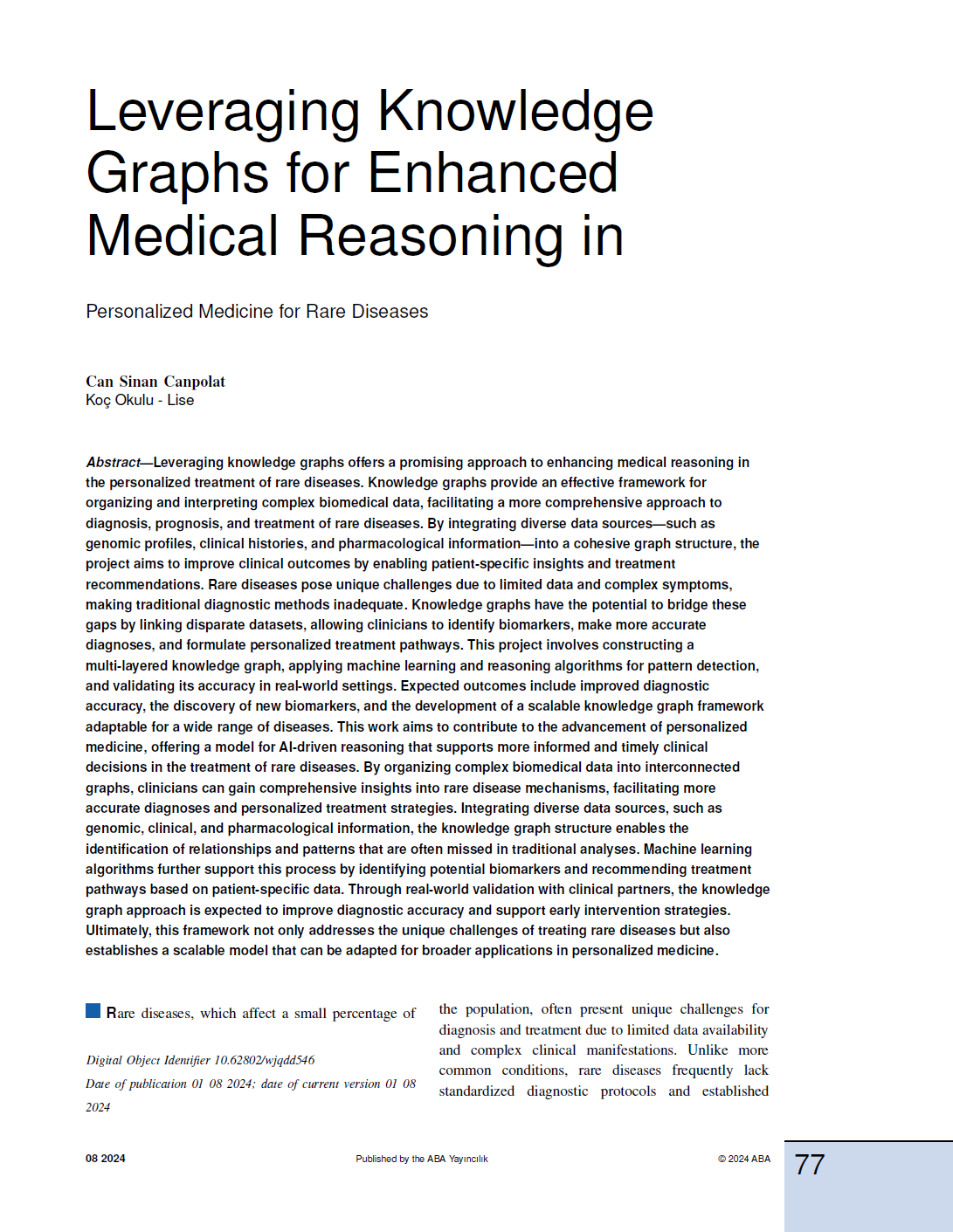Leveraging Knowledge Graphs for Enhanced Medical Reasoning in Personalized Medicine for Rare Diseases
DOI:
https://doi.org/10.62802/jj57vn49Keywords:
Knowledge Graphs in Healthcare, Personalized Medicine, Biomedical Data Integration, Genomic Data Analysis, Pattern Detection in Medical Data, Machine Learning for Healthcare, AI in Diagnostics, Clinical Outcome ImprovementAbstract
Leveraging knowledge graphs offers a promising approach to enhancing medical reasoning in the personalized treatment of rare diseases. Knowledge graphs provide an effective framework for organizing and interpreting complex biomedical data, facilitating a more comprehensive approach to diagnosis, prognosis, and treatment of rare diseases. By integrating diverse data sources—such as genomic profiles, clinical histories, and pharmacological information—into a cohesive graph structure, the project aims to improve clinical outcomes by enabling patient-specific insights and treatment recommendations. Rare diseases pose unique challenges due to limited data and complex symptoms, making traditional diagnostic methods inadequate. Knowledge graphs have the potential to bridge these gaps by linking disparate datasets, allowing clinicians to identify biomarkers, make more accurate diagnoses, and formulate personalized treatment pathways. This project involves constructing a multi-layered knowledge graph, applying machine learning and reasoning algorithms for pattern detection, and validating its accuracy in real-world settings. Expected outcomes include improved diagnostic accuracy, the discovery of new biomarkers, and the development of a scalable knowledge graph framework adaptable for a wide range of diseases. This work aims to contribute to the advancement of personalized medicine, offering a model for AI-driven reasoning that supports more informed and timely clinical decisions in the treatment of rare diseases. By organizing complex biomedical data into interconnected graphs, clinicians can gain comprehensive insights into rare disease mechanisms, facilitating more accurate diagnoses and personalized treatment strategies. Integrating diverse data sources, such as genomic, clinical, and pharmacological information, the knowledge graph structure enables the identification of relationships and patterns that are often missed in traditional analyses. Machine learning algorithms further support this process by identifying potential biomarkers and recommending treatment pathways based on patient-specific data. Through real-world validation with clinical partners, the knowledge graph approach is expected to improve diagnostic accuracy and support early intervention strategies. Ultimately, this framework not only addresses the unique challenges of treating rare diseases but also establishes a scalable model that can be adapted for broader applications in personalized medicine.
References
Ahmadi, N., Zoch, M., Sedlmayr, B., Schuler, K., Hahn, W., Sedlmayr, M., … & Wolfien, M. (2023). Context-sensitive common data models for genetic rare diseases – a concept.. https://doi.org/10.3233/shti230443
Berger, A. (2024). Pareto-principle in rare disease education: assessing the representation of ’common’ rare diseases in medical education and coding systems.. https://doi.org/10.21203/rs.3.rs-3774640/v1
Cao, L. (2024). Autord: an automatic and end-to-end system for rare disease knowledge graph construction based on ontology-enhanced large language models (preprint).. https://doi.org/10.2196/preprints.60665
Morgenthau, A., Margus, C., Mackley, M., & Miller, A. (2022). Rare disease education outside of the classroom and clinic: evaluation of the rare compassion program for undergraduate medical students. Genes, 13(10), 1707. https://doi.org/10.3390/genes13101707
Wang, H., Zu, Q., Lu, M., Chen, R., Yang, Z., Gao, Y., … & Ding, J. (2022). Application of medical knowledge graphs in cardiology and cardiovascular medicine: a brief literature review. Advances in Therapy, 39(9), 4052-4060. https://doi.org/10.1007/s12325-022-02254-7
Zheng, Y. (2024). Rare and complex diseases in focus: chatgpt's role in improving diagnosis and treatment. Frontiers in Artificial Intelligence, 7. https://doi.org/10.3389/frai.2024.1338433









